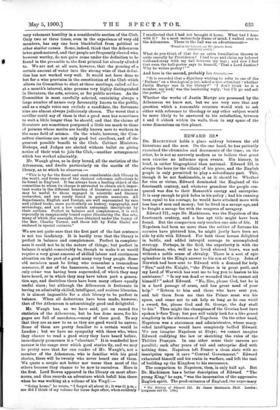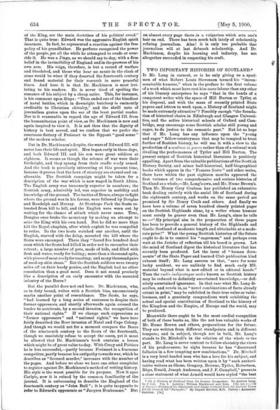EDWARD
Da. MACKINNON holds a place midway between the old historians and the new. On the one hand, he has patiently examined the chronicles and documents of the time; on the other, he is not so narrowly modern as to believe that great men exercise no influence upon events. His history, in brief, is rather biographical than national. Edward III, is always the hero (or the villain) of his piece, and the English people is only permitted to play a subordinate part. This, though it be not fashionable, is as it should be. Whether for vice or virtue, Edward dominated the England of the fourteenth century, and whatever grandeur the people con- quered was due to their Monarch's energy and enterprise. It is easy enough to pick holes in his policy ; had his cunning been equal to his courage, he would have attained more with less loss of men and money; but he lived in a savage age, and he fought a savage foe with the weapons of savagery.
Edward III., says Dr. Mackinnon, was the Napoleon of the fourteenth century, and a less apt title might have been found. But the comparison only touches one side of life. If Napoleon had been no more than the soldier of fortune his enemies have pictured him, he might justly have been set side by side with Edward. For both these heroes delighted in battle, and added intrepid courage to accomplished strategy. Perhaps, in the field, the superiority is with the Englishman, who, well as he loved shrewd blows, was not without a noble sense of chivalry. There is a sort of epic splendour in the King's answer to his son at Crecy. John of Norwich had been sent to Edward with a demand for help. "Sire," said the Knight, "the Prince is in great peril, and my Lord of Warwick has sent me to beg you to hasten to his assistance." "Is my son dead or wounded that he cannot aid himself ?" asked Edward. "No, Sire, please God, but be is in a hard passage of arms, and has great need of your help." "Return to him and those who have sent you, and tell them from me that the Prince must win his spurs, and come not to ask help so long as he can wield a sword, for, please God and St. George, the day shall be his." Thus might the champions of the Grecian host have spoken before Troy; but you will vainly look for a like grand simplicity in the utterances of Napoleon. On the other hand, Napoleon was a statesman and administrator, whose many- sided intelligence would have completely baffled Edward. We can imagine Napoleon at Sluys; we cannot imagine Edward codifying the law or sketching the rules of the Theatre Francais. In one other sense their careers are parallel; each after years of toil and enterprise died with nothing done. Napoleon left France a clean slate with no inscription upon it save "Central Government." Edward exhausted himself and his realm in warfare, and left the task of building up the Kingdom to his successors.
The comparison to Napoleon, then, is only half apt. But Dr. Mackinnon has a better description of Edward. "The young King," he says, "was the incarnation of the aggressive English spirit. The predominance of England, the supremacy
• The History of Edward III. By James Mackinnon, Ph.D. London : Longuianz and Co. [1884 of the King, are the main doctrines of his political creed." That is quite tame: Edward was the aggressive English spirit incarnate. In fact, he represented a reaction against the free policy of his grandfather. He perforce recognised the power of the people, yet all the while he attempted to evade or over- ride it. He was a Jingo, as we should say to-day, with a firm belief in the invincibility of England and in the prowess of his own arm. His reign, therefore, is but a record of warfare and bloodshed, and those who hear no music in the clash of arms would be wiser if they deserted the fourteenth century and found material for their research in more peaceful times. And here it is that Dr. Mackinnon is most irri- tating to his readers. He is never tired of spoiling the romance of his subject by a cheap satire. This, for instance, is his comment upon Slays : "Thus ended one of the bloodiest of naval battles, which in downright butchery is eminently creditable to Christian chivalry," and the shrill note of journalism grates upon the ear of the least partial reader. Nor is it reasonable to regard the age of Edward III. from the humanitarian point of view, as Dr. Mackinnon is now and again inspired to view it. It is not thus that the dignity of history is best served, and we confess that we prefer the courteous flattery of Froissart to the flippant "good sense" of the modern scholar.
But in Dr. Mackinnon's despite, the wars of Edward III. will never lose their life and spirit. Men began early in those days, and both Edward III. and his son were great soldiers at eighteen. It seems as though the science of war were their birthright, and they sprang from their cradle ready armed. And the book is peculiarly interesting at this present time, because it proves that the laws of strategy are eternal and un- alterable. The Scottish campaign might be taken for a description of the war which is now waged in South Africa. The English army was immensely superior in numbers ; the Scottish army, admirably led, was superior in mobility and knowledge of the ground. The tactics of Bruce, always to fight where the ground was in his favour, were followed by Douglas and Randolph and Murray. At Stanhope Park the Scots re- treated from hill to hill, and the English were worn out by waiting for the chance of attack which never came. True, Douglas once broke the monotony by making an attempt to seize the King with his own hand. But he did no more than kill the Royal chaplain, after which exploit he was compelled to retire. So the two hosts watched one another, until the English, starved with the delay, mounted the hill where the Scots were encamped. There they "found five hundred dead oxen which the Scots had killed in order not to encumber their retreat; a large number of pots, made of hide, and filled with flesh and water, ready for boiling; more than a thousand spits, with pieces of meat ready for roasting; and many thousand pairs of used-up skin shoes." But the Scottish soldiers were twenty miles off on their hardy ponies, and the English had no other consolation than a good meal. Does it not sound precisely like a description of an early encounter with the mounted infantry of the Boers ?
But the parallel does not end here. Dr. Mackinnon, who, as in duty bound, writes with a Scottish bias, unconsciously marks another point of resemblance. The Scots, he says, "had learned by a long series of successes to despise their former oppressors, and shortly afterwards again crossed the border to accelerate, by a second invasion, the recognition of their national rights." If we change such expressions as "former oppressors" and "national rights," we have here fairly described the Boer invasion of Natal and Cape Colony. And though we would not for a moment compare the Boers of the nineteenth century to the Scots of the fourteenth, though we resolutely refuse to accept the omen, yet it must be allowed that Dr. Mackinnon's book contains a lesson which might be of great value to-day. With Crecy and Poitiers he is less successful,—partly because Froissart is a fearsome competitor, partly because his antipathy towards war, which he describes as "licensed murder," increases with the number of the pages. And before we close we have one other complaint to register against Dr. Mackinnon's method of writing history. His style is the worst possible for its purpose. Now it apes Carlyle, now it is ruined by the common familiarity of the journal. It is unbecoming to describe the England of the fourteenth century as "John Bull "; it is quite inapposite to refer to Edward's opponents as "Jacques Bonhomme." But
on almost every page there is a vulgarism which seta one's hair on end. There has been much talk lately of scholarship refining journalism. Alas ! it is only too probable that journalism will at last debauch scholarship. And Dr. Mackinnon, despite his learning and industry, has not altogether succeeded in respecting his craft.







































 Previous page
Previous page